Rhea Seehorn From 'Better Call Saul' Has a Secret Bar Sitcom
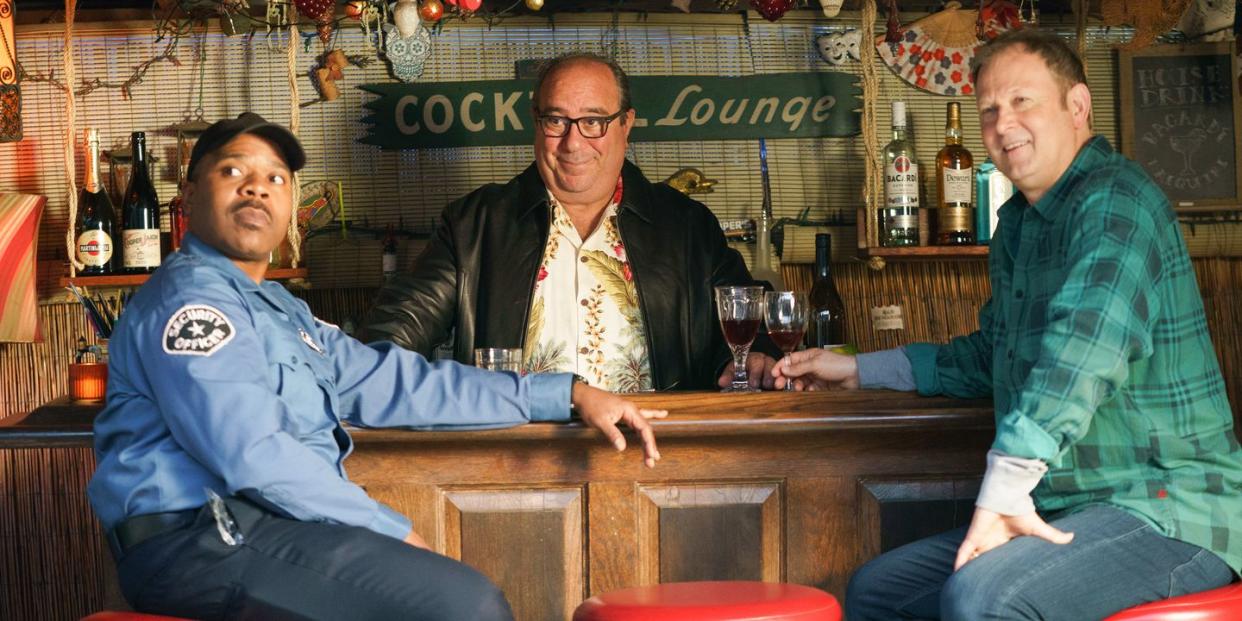
- Oops!Something went wrong.Please try again later.
- Oops!Something went wrong.Please try again later.
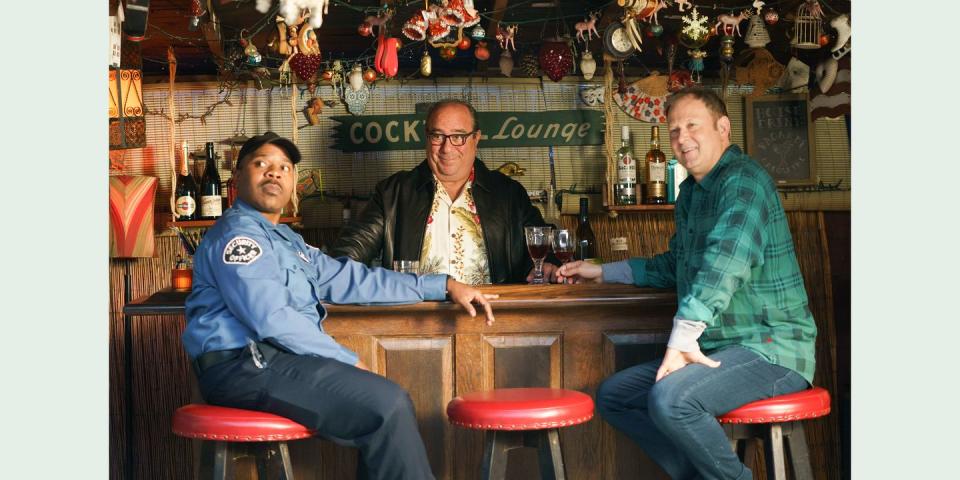
Cooper’s Bar, a new sort of series from AMC, (well, kinda but more on that later), is a sitcom set in a bar and therefore very enticing. Sitcoms, like bars, work best when little happens. Bars, like sitcoms, are steady state affairs with stable casts and a comforting patter of good friends jawing. They are much needed oases of calm because, let’s face it, everything happens so much. Sometimes you need a little less.
On a more personal level, having burned through Barry, binged on Stranger Things and exhausted Better Call Saul—all shows in which many things happen—I was thirsty just to watch something with a lot of nothing in it. Cooper’s Bar has that. Plus it is prestige television adjacent. The show stars and was co-created by Better Call Saul’s Rhea Seehorn for whom I, along with half of America, feel an intense quasi-Oedipal longing. But there’s even more that draws one to Cooper’s Bar, namely the presence of Louis Mustillo. The three best accents of the Eastern Seaboard belong to Philadelphia (wudder); Baltimore (hon) and Buffalo NY. One of the best parts of 65-year-old actor’s career is that he has brought those flat A’s to Hollywood in shows like Mike & Molly’s and now, Cooper’s.
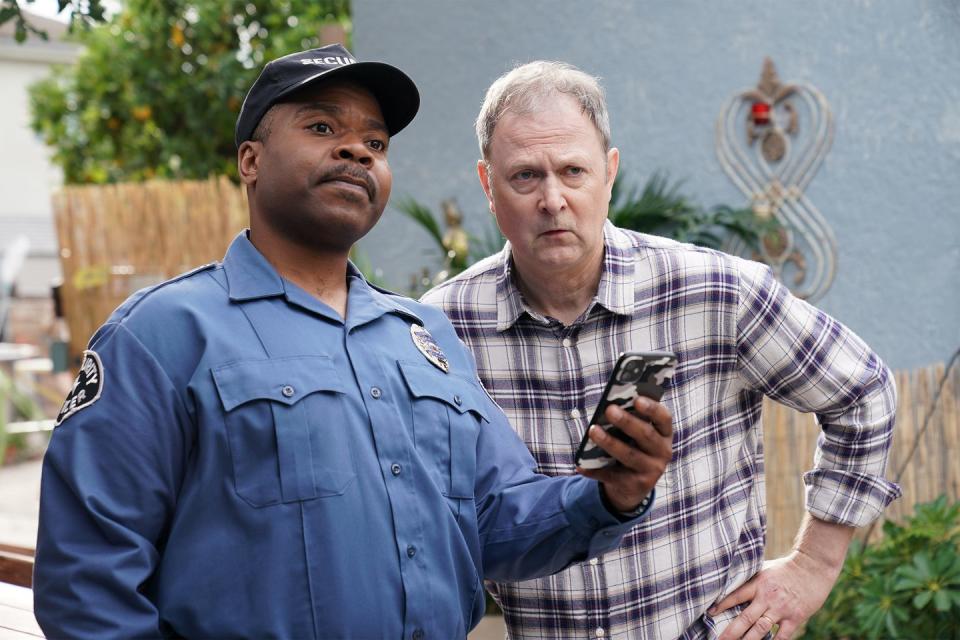
The set up is simple enough. Cooper Marino (Louis Mustillo) has a backyard tiki bar in Los Angeles. Guess the name. By day he’s a middling character actor but one who has made peace with the fact that above-title billing has passed him by. By some act of divine intervention, or scheduling error—verisimilitude is not a sitcom’s forte—Kris Latimer (Seehorn), a studio exec and self-described Biggest Dick in Hollywood, stumbles into this backyard bar. Having thus stumbled and offered a goblet of Cabernet, Cooper along with his two friends, an aspiring writer Brandon Washington (Casey Washington) and an English director David Butler (David Conolly), pitch her a show about a struggling character actor who has made peace with the fact that above-title billing has passed him by and opens a bar in his backyard. Guess the name. She loves it, as a vehicle for... Amy Schumer. Marino takes issue with the casting decision, bristles at the exploitation of his private life for corporate profits and, because she embodies Hollywood’s douchey rapacity, generally farts in Latimer’s general direction. There are hot wings involved and, inexplicably for a tiki bar, endless amounts of Cabernet yet not Corpse Revivers, Mai Tai’s or Jungle Birds.
However, having settled in for a night of getting lost in other people’s petty problems, my plans quickly went sideways. First of all, each episode is only ten or eleven minutes. That’s the length of a single Kids in the Hall sketch or a leisurely deuce. What’s more, a disproportionate amount of that time is spent with credits and theme song. (By the Indonesian indie trio Elephant Kind.) By the time the preliminaries are observed, we’re talking eight or nine minutes of narrative tops. Just like a bunch of drummies or flats, what meat there is is awfully slim pickings. Sure there is nominally a plot which involves Cooper’s aloof Buffalonian resistance to being coopted by the Hollywood system as well as subplots involving a TikTok influencer. But there are few jokes and fewer laughs. What attempts are made to get them feel half-hearted and faint.
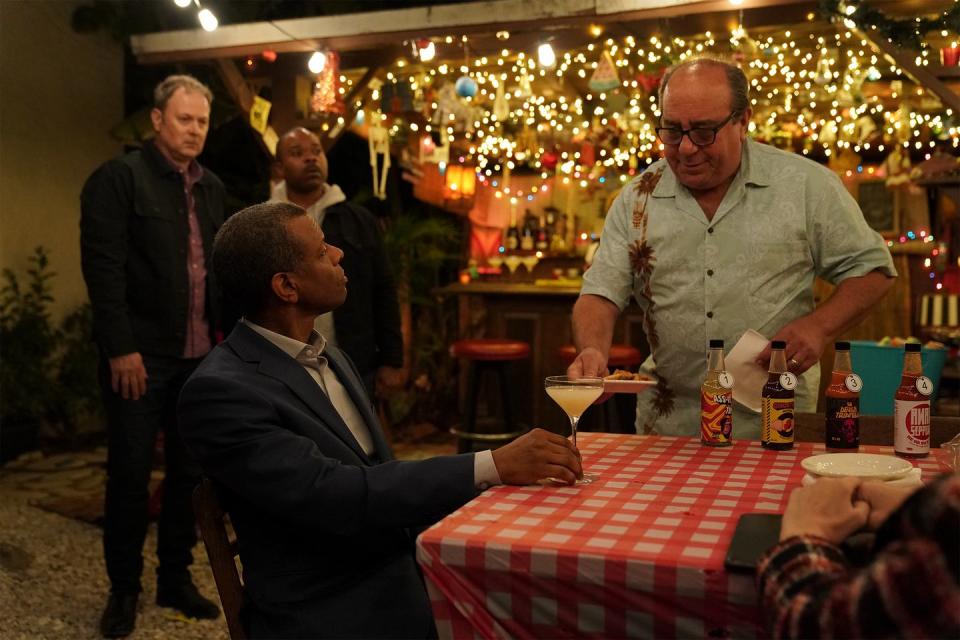
Of course, the nothing that happens (or doesn’t happen) in a bar or a sitcom is of course not literal. Literal nothingness is boring; its vastness depresses. What a good bar and a good sitcom have in common is, to put it more precisely, not that there are no occurrences but that there is no agenda. Afternoons float by. The years flow by. Time measured by the peeling of paint on the luncheonette wall. (That’s from Hall & Oates criminally underrated song Abandoned Luncheonette, btw.) But at Cooper’s Bar, the minutes don’t slide by. Even at only eleven of them, they drag. How could something this desultory get made?
Puzzled, I began to look into what this strange creation was. It felt almost like a high school senior project in television production. In fact, it felt like MY high school senior project in television production. As it turns out, Cooper’s Bar isn’t actually a product of AMC, or AMC+ but of AMC’s Branded Content Studio, called deadpannedly The Content Room. According to Variety, the Content Room is “an ad sales initiative the company recently launched to focus on branded content, talent integrations and franchise extensions.” Cooper’s Bar, therefore is a new breed of advertising. One which leverages the draw of well-known names, in this case Seehorn’s, tied to popular programming, in this case Better Call Saul’s second season, in shows that are, from the moment the money sperm penetrates the art egg, at the service of what we used to call advertisers but now refer to as brand partners.
Suddenly the show made sense. It explained why in episode 103 when a TikTok influencer named Billy Canasta (@flexhousebilly) swings by with his cadre of phone-toting nincompoops, he asks very specifically for a “Bacardi daiquiri, bro” to which Cooper replies, placing the bottle label toward camera, “I’ve been drinking quite a few of these myself!” to which Canasta rejoins, “You should make it like the house drink, right man?”
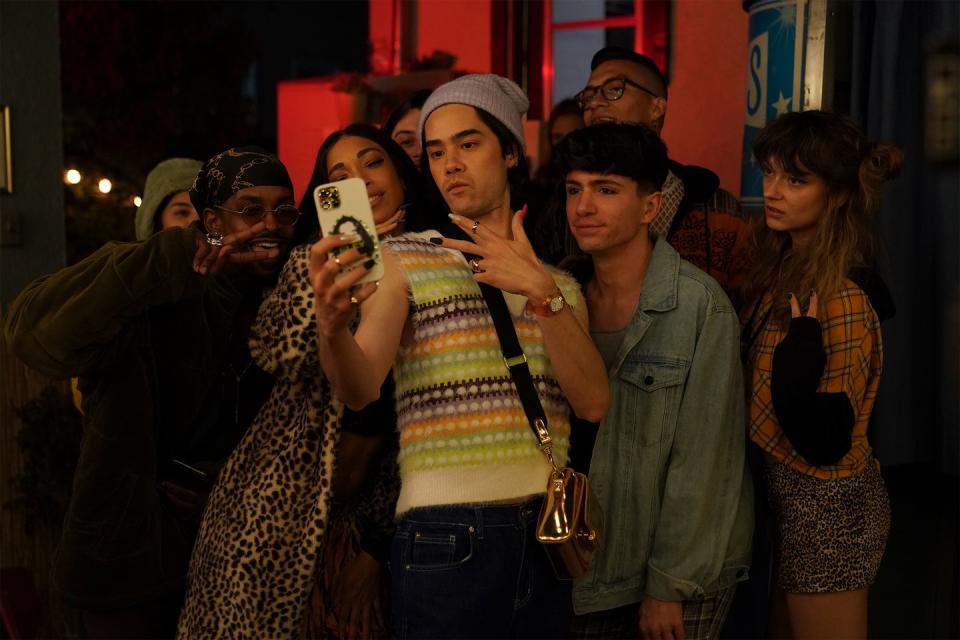
Product placement is, of course, nothing new. In fact, as the New York Times noted, it’s a rapidly growing $23 billion industry. And yet, this is something different. When Tom Wambsgans or Logan Roy uses a Dell in Succession, it isn’t that the entire artifice of series was constructed simply to showcase its 8MB video storage. On the other hand, every aspect of Cooper’s Bar from the theme song -- a partnership, as it turns out with Elephant Kind and their label -- to the rattan furniture is there explicitly for the purposes of selling us something.
Now normally, this would be the end of Cooper’s Bar for me. Like I said, neither bar nor sitcom shall have an agenda. And in content, as at bars, it’s good to know who is picking up the tab and what they want in return and a warning when that is not disclosed forthrightly. But for some reason, I was hooked on Cooper deep. Suddenly the meta-ness of the plot became more like a call-came-from-in-the-building satire. Mustillo, it turns out, does have a bar in his backyard, the very bar used as a set. And he is a character actor and he is from Buffalo (that I knew). The in-show conflict between Hollywood’s relentless profit chasing (Seehorn) and a guy who just has a bar in his backyard, wants to make a show about it and is strong-armed into compromising his morals to feed the beast of the networks feels a little too real all of a sudden. In fact, watching Cooper’s Bar, which started as a passion project and turned into a profit center, meant that, in the end, Mustillo finally capitulated to capital. Was it Cooper’s Bar or Coöper’s Bar? Was this a Christopher Guest-meets-Christopher Nolan mind fuck of meta critique of Hollywood or simply an ad using self-awareness as a moral fig leaf? This I contemplated as the six episodes dragged on and by the end I needed a drink. A Bacardi Daquiri, bro, I’ve been drinking quite a few of them myself.
You Might Also Like

